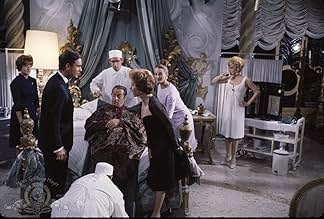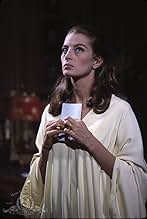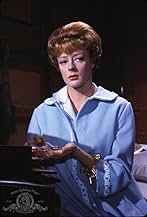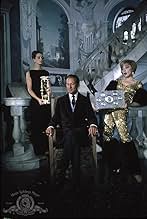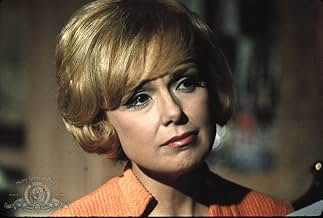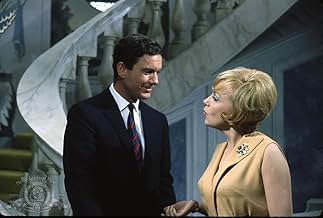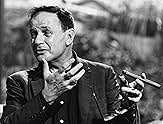NOTE IMDb
6,7/10
3,2 k
MA NOTE
À Venise, un millionnaire engage un acteur pour l'aider à faire croire à ses trois ex-petites amies qu'il est en train de mourir et qu'il compte léguer sa fortune à l'une d'entre elles.À Venise, un millionnaire engage un acteur pour l'aider à faire croire à ses trois ex-petites amies qu'il est en train de mourir et qu'il compte léguer sa fortune à l'une d'entre elles.À Venise, un millionnaire engage un acteur pour l'aider à faire croire à ses trois ex-petites amies qu'il est en train de mourir et qu'il compte léguer sa fortune à l'une d'entre elles.
- Réalisation
- Scénario
- Casting principal
Herschel Bernardi
- Oscar Ludwig
- (scènes coupées)
Massimo Serato
- The Pretender
- (scènes coupées)
Jack Benny
- Violinist outside restaurant
- (non crédité)
Mimmo Poli
- Cook
- (non crédité)
Luigi Scavran
- Massimo
- (non crédité)
Avis à la une
This is a very good film adaptation of a story that has had a number of permutations. The original source of the story dates to British poet and playwright Ben Jonson's (1572-1637) satirical play, "Volpone." Thomas Sterling's "Evil of the Day" was a 1955 novel, and playwright Frederick Knott then adapted that source into the play, "Mr. Fox of Venice."
The theme of the original work is carried through all the renditions of the story. It's a biting satire on greed, with a complex staged practical joke as the main plot. The comedy isn't of the rollicking laughter type, but in the exaggerations with the drama and the characters themselves. Most of the characters of the Ben Jonson play are carried through all renditions, except that in the 20th century story the three characters of avarice are women instead of men.
Director Joseph Mankiewicz does a masterly job of adapting and then directing the story, with an introduction and closing comments in voice over by the main character, Cecil Fox. He uses this technique very subtly for one other character toward the end. Another reviewer delighted in what he called the "Maltese Falcon" ending. It is fantastic in itself.
The film was made mostly in Rome, with some canal scenes shot in Venice. The producers assembled a first-rate cast to play the diverse roles. All give performances worthy of academy award nominations. Rex Harrison is superb as Cecil Fox, and Susan Hayward dominates her scenes as Mrs. Sheridan - Fox's "Lone Star" mistress from the past. Cliff Robertson adds enough mystery to his dutiful and slyly charming role as William McFly. A nearly 40 Capucine still radiates the sophisticated beauty for which she was known, here playing Princess Dominique. And Maggie Smith shows for the first time on film her deftness for deadpan humor. Her nurse Sarah Watkins is both demure, suspicious and slightly sly.
Adolfo Celi is very good as Inspector Rizzi, who plays some scenarios superbly for comedy. The scenes in his home are hilarious where his family members are glued to the TV watching a Perry Mason mystery show. The Italian voice-over for Raymond Burr's Mason is hilarious - a high-pitched male voice coming out of the tube when Perry speaks.
But the star who provides most of the laughter in "The Honey Pot" is Edie Adams. She plays Merle McGill, an otherwise attractive movie star who, underneath, is little more than a ditzy blonde and opportunist. She was someone Fox picked up off the street years before and turned into a movie icon.
Here are some favorite lines form this film.
Inspector Rizzi, "Miss McGill, I understand the necessity of you to arrive in Venice incognito." Merle McGill, "I wouldn't go anywhere (sic) uninvited." Inspector Rizzi, "I must have used the wrong word. My English is uh...." Merle McGill, "It must be hard for you to imagine, inspector - a man like Cecil Fox and I." Inspector Rizzi, "Not hard at all." McGill, "How can I say it, inspector? He was my first... man. Somehow, you just never forget your first man." Rizzi, "I remember mine, vividly. He also got away."
Merle McGill, "OK, shamus, so what's on your mind? Or, to be exact, on both your minds?" Inspector Rizzi, "Shamus? You use too many American idioms I do not know."
Merle McGill, "When you do talk to Princess Dominique, you know what she's gonna tell ya?" Inspector Rizzi, "If I had such capability, I would never get out of bed." McGill, "She's gonna say that she and I were here, in my room, all night, playing gin rummy together. That'll be a lie. For one thing, she can't even play gin rummy." Rizzi, "Fascinating! Now why would she choose a game she could not play?" McGill, with a "caught" look on her face, "Yeah, that was stupid of her, but the name of the game isn't important."
Princess Dominique, "I have no need for Mr. Fox's money." Inspector Rizzi, "That is what truly baffles me. This incredible wealth which nobody needs and everybody wants."
The theme of the original work is carried through all the renditions of the story. It's a biting satire on greed, with a complex staged practical joke as the main plot. The comedy isn't of the rollicking laughter type, but in the exaggerations with the drama and the characters themselves. Most of the characters of the Ben Jonson play are carried through all renditions, except that in the 20th century story the three characters of avarice are women instead of men.
Director Joseph Mankiewicz does a masterly job of adapting and then directing the story, with an introduction and closing comments in voice over by the main character, Cecil Fox. He uses this technique very subtly for one other character toward the end. Another reviewer delighted in what he called the "Maltese Falcon" ending. It is fantastic in itself.
The film was made mostly in Rome, with some canal scenes shot in Venice. The producers assembled a first-rate cast to play the diverse roles. All give performances worthy of academy award nominations. Rex Harrison is superb as Cecil Fox, and Susan Hayward dominates her scenes as Mrs. Sheridan - Fox's "Lone Star" mistress from the past. Cliff Robertson adds enough mystery to his dutiful and slyly charming role as William McFly. A nearly 40 Capucine still radiates the sophisticated beauty for which she was known, here playing Princess Dominique. And Maggie Smith shows for the first time on film her deftness for deadpan humor. Her nurse Sarah Watkins is both demure, suspicious and slightly sly.
Adolfo Celi is very good as Inspector Rizzi, who plays some scenarios superbly for comedy. The scenes in his home are hilarious where his family members are glued to the TV watching a Perry Mason mystery show. The Italian voice-over for Raymond Burr's Mason is hilarious - a high-pitched male voice coming out of the tube when Perry speaks.
But the star who provides most of the laughter in "The Honey Pot" is Edie Adams. She plays Merle McGill, an otherwise attractive movie star who, underneath, is little more than a ditzy blonde and opportunist. She was someone Fox picked up off the street years before and turned into a movie icon.
Here are some favorite lines form this film.
Inspector Rizzi, "Miss McGill, I understand the necessity of you to arrive in Venice incognito." Merle McGill, "I wouldn't go anywhere (sic) uninvited." Inspector Rizzi, "I must have used the wrong word. My English is uh...." Merle McGill, "It must be hard for you to imagine, inspector - a man like Cecil Fox and I." Inspector Rizzi, "Not hard at all." McGill, "How can I say it, inspector? He was my first... man. Somehow, you just never forget your first man." Rizzi, "I remember mine, vividly. He also got away."
Merle McGill, "OK, shamus, so what's on your mind? Or, to be exact, on both your minds?" Inspector Rizzi, "Shamus? You use too many American idioms I do not know."
Merle McGill, "When you do talk to Princess Dominique, you know what she's gonna tell ya?" Inspector Rizzi, "If I had such capability, I would never get out of bed." McGill, "She's gonna say that she and I were here, in my room, all night, playing gin rummy together. That'll be a lie. For one thing, she can't even play gin rummy." Rizzi, "Fascinating! Now why would she choose a game she could not play?" McGill, with a "caught" look on her face, "Yeah, that was stupid of her, but the name of the game isn't important."
Princess Dominique, "I have no need for Mr. Fox's money." Inspector Rizzi, "That is what truly baffles me. This incredible wealth which nobody needs and everybody wants."
Coming at the end of a prosperous string of all-star mystery films, THE HONEY POT suffered more from a lame title and timing than anything on screen when first released (an even worse title, "Up Pops Murder" didn't help when the film was first released to television).
The typically superb script and direction from Joseph L. Mankiewicz, from a play by mystery writer Frederick Knott, inspired in turn by Ben Johnson's classic play, VOLPONE, THE HONEY POT could not have had a better cast with Rex Harrison (at the top of his game) as the supposedly super-wealthy Cecil Fox mentally tilting with his secretary, Cliff Robertson, and a nosy nurse/love interest for Robertson, a very young Maggie Smith (younger viewers may be interested to see this very different performance from HARRY POTTER's Professor McGonagall - as well as her amazing Desdemona opposite Olivier's OTHELLO) and a trio of ex-loves, Edie Adams, Cappucine and Susan Hayward all in Fox's beautiful Venetian palatzo (the exterior shots are as gorgeous and the interiors).
A death happens (accident? perhaps murder?) and a Venetian police inspector, Adolfo Celi, enters the picture (lovely side note as his family at home is enraptured with PERRY MASON on American TV more than his real-life work) and the film starts to leave Ben Johnson's Volpone behind and delve into more complex games.
To be frank, this film has long been among my favorites - I have been accused of teaching an entire university course on Mystery Writers just to develop an audience for it. Showing the film at the conclusion of the course, after considering the progression of great mystery writing from Poe to Conan Doyle to Christie, Hammett and beyond, this marvelous under-appreciated work from Knott & Mankiewicz never fails to grab them. It's well worth a look for anyone interested in good literate fun, great performances and writing that don't depend on splatter gore, special effects or CGI.
While the ongoing box-office clout of stars Harrison and Hayward got the film a limited VHS release, it's hard to a copy today - but well worth the search.
Wonderful film...if only it had a better title.
The typically superb script and direction from Joseph L. Mankiewicz, from a play by mystery writer Frederick Knott, inspired in turn by Ben Johnson's classic play, VOLPONE, THE HONEY POT could not have had a better cast with Rex Harrison (at the top of his game) as the supposedly super-wealthy Cecil Fox mentally tilting with his secretary, Cliff Robertson, and a nosy nurse/love interest for Robertson, a very young Maggie Smith (younger viewers may be interested to see this very different performance from HARRY POTTER's Professor McGonagall - as well as her amazing Desdemona opposite Olivier's OTHELLO) and a trio of ex-loves, Edie Adams, Cappucine and Susan Hayward all in Fox's beautiful Venetian palatzo (the exterior shots are as gorgeous and the interiors).
A death happens (accident? perhaps murder?) and a Venetian police inspector, Adolfo Celi, enters the picture (lovely side note as his family at home is enraptured with PERRY MASON on American TV more than his real-life work) and the film starts to leave Ben Johnson's Volpone behind and delve into more complex games.
To be frank, this film has long been among my favorites - I have been accused of teaching an entire university course on Mystery Writers just to develop an audience for it. Showing the film at the conclusion of the course, after considering the progression of great mystery writing from Poe to Conan Doyle to Christie, Hammett and beyond, this marvelous under-appreciated work from Knott & Mankiewicz never fails to grab them. It's well worth a look for anyone interested in good literate fun, great performances and writing that don't depend on splatter gore, special effects or CGI.
While the ongoing box-office clout of stars Harrison and Hayward got the film a limited VHS release, it's hard to a copy today - but well worth the search.
Wonderful film...if only it had a better title.
A very rich man sets up a scheme to convince 3 old lovers that he is dying and they - individually - are potentially his heir. Good performances by Harrison, Robertson and Maggie Smith. An end worthy of Agatha Christie - with all the players brought together and the details brought out.
What a charming surprise to find this overlooked gem of a movie, a modern day update of Ben Jonson's Volpone. It was the cast that attracted my attention. Rex Harrison, Maggie Smith, Susan Hayward, Cliff Robertson, Edie Adams - how can you go wrong? They all acquit themselves well in this elegant whodunit - and whydidhedoit - romp. Adolfo Celi (Lago in Thunderball) is particularly good as the police inspector. The plot has enough false leads, misdirection and twists to make your head spin. The Venetian (or faux Venetian) interiors are splendidly luxuriant, and the exteriors are lovely. This is a lightheartedly elegant dark comedy that most entertainingly fills an hour or two. Highly recommended.
This film is pretty good, but it was a flop in 1967 despite having some good performances by Rex Harrison, Clift Robertson, Susan Hayward, Capucine, Edie Adams, and Maggie Smith. The script and direction of Joseph Mankiewicz were perfect. But it flopped, possibly because the times did not call for a literate murder mystery film.
It's lineage is impeccable since it begins with Ben Jonson's classic Jacobean comedy "Volpone". But actually it is not "Volpone". The film is based on Thomas Sterling's "The Evil of the Day". The story has been changed in one way. Sterling's novel brings together three would-be heirs too, but two are men, and one is Fox's wife (as in the movie - Susan Hayward's role). But the same plot switches go on in the novel as in this film.
I enjoyed the movie, in particular one moment that was rare to see in any film of that period. Harrison has invited his three would-be heirs to come to dinner. Hayward (accompanied by her secretary Smith) comes in first. While they are talking to Harrison and Robertson, both Adams and Capucine show up at the doorway. Neither is willing to let the other go in first. They end up pushing into each other through the door frame into the dining room, thoroughly uncomfortable - but at least neither was forced to wait for the other to make the first move.
It's lineage is impeccable since it begins with Ben Jonson's classic Jacobean comedy "Volpone". But actually it is not "Volpone". The film is based on Thomas Sterling's "The Evil of the Day". The story has been changed in one way. Sterling's novel brings together three would-be heirs too, but two are men, and one is Fox's wife (as in the movie - Susan Hayward's role). But the same plot switches go on in the novel as in this film.
I enjoyed the movie, in particular one moment that was rare to see in any film of that period. Harrison has invited his three would-be heirs to come to dinner. Hayward (accompanied by her secretary Smith) comes in first. While they are talking to Harrison and Robertson, both Adams and Capucine show up at the doorway. Neither is willing to let the other go in first. They end up pushing into each other through the door frame into the dining room, thoroughly uncomfortable - but at least neither was forced to wait for the other to make the first move.
Le saviez-vous
- AnecdotesThe great Italian cinematographer Gianni Di Venanzo died suddenly of hepatitis (aged only 45) during the making of this movie, with many weeks of the five-month shooting schedule to go before completion. His operator, Pasqualino De Santis, took over as director of photography, but refused credit in this capacity, although he would quickly go on to international renown with his work for Luchino Visconti, Franco Zeffirelli, Joseph Losey, and others.
- GaffesNear the beginning, when Dominique is bent over drawing her bath, a shadow of the camera falls across her back.
- Citations
William McFly: An actor's gratitude is, at best, a mirage.
- Crédits fous"Based Upon: A Play by Frederick Knott and A Novel by Thomas Sterling - and A Play by Ben Jonson"
- ConnexionsFeatured in Discovering Film: Rex Harrison (2015)
Meilleurs choix
Connectez-vous pour évaluer et suivre la liste de favoris afin de recevoir des recommandations personnalisées
- How long is The Honey Pot?Alimenté par Alexa
Détails
Box-office
- Budget
- 6 000 000 $US (estimé)
- Montant brut mondial
- 11 159 $US
- Durée2 heures 30 minutes
- Couleur
- Rapport de forme
- 1.85 : 1
Contribuer à cette page
Suggérer une modification ou ajouter du contenu manquant

Lacune principale
By what name was Guêpier pour trois abeilles (1967) officially released in India in English?
Répondre


